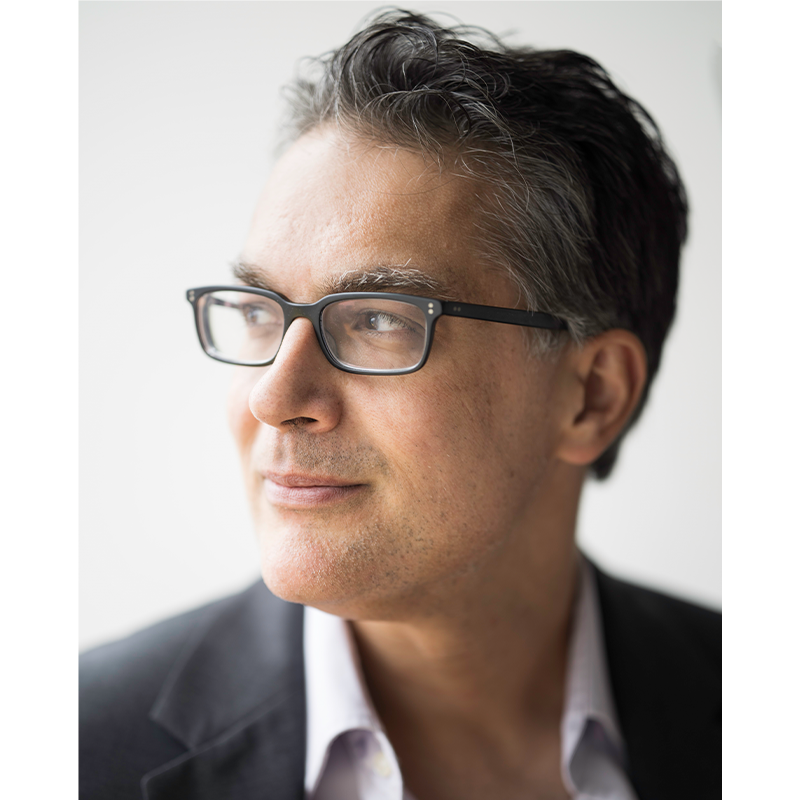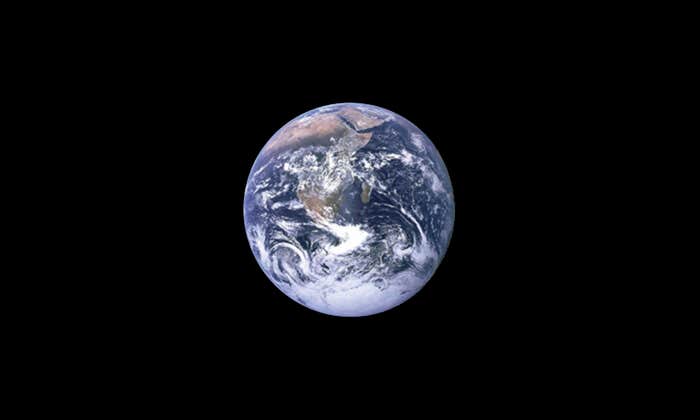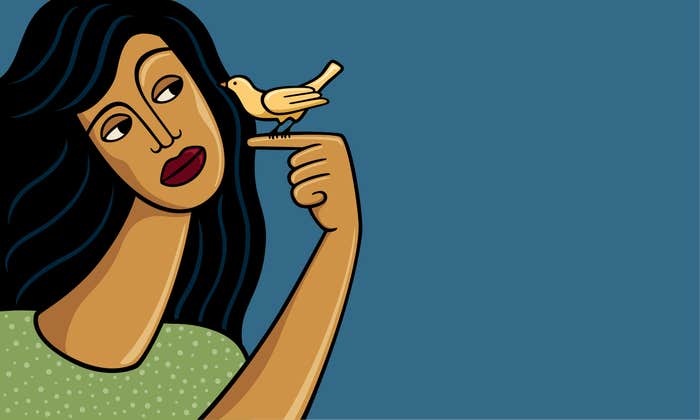Grief-stricken at the recent death of her brother, and sitting alone at the foot of her bed, Wanda Maximoff, the superhero with telepathic and telekinetic powers, is watching the family sitcom Malcolm in the Middle when she calls after her roommate, Vision. The perceptive and charmingly English-accented humanoid AI fades through her bedroom wall and, after some small talk about the show’s perplexing slapstick humor (Vision wonders why a pergola collapsing on Malcolm’s dad is funny) he quickly gathers, by how guarded and distant she seems, that Wanda’s not in a happy mood. What follows is one of the most celebrated and touching moments in the Marvel miniseries WandaVision.
“Wanda, I don’t presume to know what you’re feeling,” Vision says. “But I would like to know, should you wish to tell me, should that be of some comfort to you.” Her guard still very much up, Wanda says, “What makes you think that talking about it would bring me comfort?” Vision, believing this to be a sincere question rather than a dismissal, starts to explain something he’s read, only for Wanda to break him off: “The only thing that would bring me comfort is seeing him again.”
Philosophically, the most important thing about grief is that it’s not always a form of self-pity.
I was reminded of this scene recently while reading Kieran Setiya’s new book Life Is Hard: How Philosophy Can Help Us Find Our Way. Each chapter, except for the last (“Hope”), homes in on difficulties we all must confront, among them infirmity, failure—and grief. “Grief,” Setiya writes, “comes in a chaos of waves and fluctuations, undetermined by reason.” Wanda echoes this exactly. “Sorry,” she tells Vision after coldly responding to his offer of help, and seeing sadness and discouragement come over his face. On the verge of tears, she continues, “I’m so tired. It’s just like this wave washing over me again and again. It knocks me down and, when I try to stand up, it just comes for me again. And I can’t … It’s just going to drown me.”
“No,” Vision says. “No it won’t.” Wanda laughs and, turning to him, asks, “How do you know?”
“Well,” Vision says, “because it can’t all be sorrow, can it?” He seems to get that perhaps he’s not the best messenger of the emotional and philosophical point he’s about to make. “I’ve never experienced loss because I’ve never had a loved one to lose,” he says. “But what is grief, if not love persevering?”
“I love that,” Setiya said, when I described that scene over our video call. At his home office, not far from MIT, where he teaches philosophy, he was surrounded by bookshelves, with books spilling off different surfaces. A black-and-white poster of an old baseball stadium (baseball shows up a lot in Setiya’s discussion of failure) rested on a chair beside him. “The right perspective in which to think about grief is that it is a manifestation of persisting love,” he said. “Sorrow is part of it, but it is a kind of complicated stress reaction in which all kinds of feelings—fear, anxiety, sometimes happy memories—are bound up in this reaction that is love continuing after the object is no longer available in the same way, as they’re gone.”

The way Vision put it is important, Setiya explained, because it’s a way of thinking about grief that pushes back against a tendency in the Western philosophical tradition to think of grief as “something we could simply extinguish, if only we were properly oriented to reality.” If only we accepted that everyone we love is going to die, and that death is final, then we could be rid of the pain of grief. It’s a tendency that regards that pain as futile. For Setiya, that’s the wrong way to think about grief. “It’s not something to extinguish,” he said. “It’s something to think about doing well.”
In my conversation with Setiya, I wanted to cover his whole book, because I found it so fascinating and insightful. Along with grief, we discussed, among other things, the difference between disease and illness, why living well isn’t simply being happy, what’s bad about loneliness, how philosophizing about pain helped him manage his own chronic pelvis pain, why intellectualizing social justice isn’t a replacement for truly advocating for reform, the philosophy of Groundhog Day, and—of course—the meaning of life.
What do you think is the biggest misunderstanding about how people should deal with grief?
People talk about the five stages of grief, but it turns out there’s no empirical support for the idea that it goes in five stages. It’s highly unpredictable. It doesn’t have a specifiable pattern. There’s also a lot of evidence that forcing people to process grief is counterproductive, that if you don’t want to talk about it and don’t want to think about it right now, probably that’s the right response. Because being forced to can often amplify and complicate trauma reactions.
Philosophically, the most important thing about grief is that it’s not always a form of self-pity. It’s not selfish. There are aspects of grief that are completely other-directed, that are just about the loss of the person you love. Extinguishing grief would be a failure to appreciate reality. It’d be a failure primarily because it would be a failure to acknowledge the loss to the other person. Keeping that in focus is, I think, something that we can do more clearly once we’ve made the kinds of distinctions philosophers make between what I call relational grief, which is about the relationship, and forms of grief that are just directed at the loss of someone else, the bereavement as a result of their dying.
I like the puzzle you raise about grief, where there never seems to stop being a good reason to grieve, if the reason for grieving is that we’ve lost someone we love, and the fact of that loss is never going away.
Right. It looks like if grief is ever appropriate, it’s always appropriate. And that creates a puzzle about how to structure one’s grief, because we don’t want to grieve forever. I think that’s where these very hard questions about what shape grief should take come in. They’re questions that just reasoning about grief—trying to think through what the rational response is to what’s happened—won’t tell us how to answer. It’s okay not to grieve forever, but rationality alone just doesn’t give us any further guidance. And so, we have to fall back on non-rational but culturally available practices. Or, in cases where they’re not available, we have to invent our own practice or our own tradition for grieving.
Is grief something that makes the distinction between happiness and living well really vivid?
Yes, because it’s a form of unhappiness or a form of emotional pain that doesn’t contrast with living well. It’s part of living well to respond to the reality of loss in this way. It’s a case where unhappiness is a signal, a signal of something awful. It’s not a signal that you should change that, because you can’t change it. It’s a signal that something terrible has happened, and that you are responding to it with the right kind of attention and appreciation.
It’s very hard to argue about how to live well.
The philosophical thought experiment that brings out the contrast between being happy and living well is someone plugged into a simulation: They’re the only person plugged in; they’re not experiencing reality. But the simulation is great and they don’t know it’s fake. They feel really happy, but they’re not really doing most of what they think they’re doing. They’re not really engaging with other people or the world in the way they think they are. That’s a case where someone experiences happiness but is not living a good life. And that’s why we need to make this distinction, and think of living well as engaging with reality in the right kind of way.
I think that’s consistent with the aspiration that when you live well, happiness will be a side effect. We should treat our unhappiness seriously, not as something to run away from, but as a signal that we’re picking something up about the world around us that we need to understand and relate to differently. We should take it as communicating something about how our life is going.
You say happiness is subjective, but isn’t what it is to live well also subjective?
It’s very hard to argue about how to live well. If you meet someone whose vision of how to live is, say, entirely selfish—they just don’t care about anyone but themselves—I don’t think there’s going to be an argument that can show that they are wrong. I do think, as a matter of fact, that isn’t a way of living well. They’re just making a mistake in how they’re living their life, even if I can’t demonstrate that to them.
To illustrate this in the book, I give the example of Bartleby in Herman Melville’s amazing novella Bartleby the Scrivener, who prefers not to do his job anymore, prefers not to accept help, prefers not to eat, and eventually dies. If you really thought there were no right or wrong answers to how to live, you’d have to say about Bartleby, “Well, that’s just how some people prefer to live. There’s nothing wrong with that way of living.” I don’t know how to prove that that’s not the case, but I think we can see in these extreme examples of Bartleby on the one hand, or the person who’s totally selfish on the other, that there are lines you can cross where you are genuinely not living well, even if you happen to feel like this is the right life for you. You’re making a mistake.
How should we think about the puzzle of disease and disability in relation to living well?
One of the surprising results in the empirical study of life satisfaction is that people who are blind or deaf or have some kind of physical disability rate their own life satisfaction surprisingly high compared to the expectations of those who are not disabled. What’s going on is that the actual impact of disability on one’s capacity to live well is not that direct. There are many ways in which you can live a decent life. It’s true that lacking sight or being deaf cuts you off from some of the good things in life, but most physical disabilities leave enough in place for us to have good lives anyway, and most of us, physically disabled or not, have fairly limited repertoires of things in the world we can engage with and get satisfaction out of.
What this suggests is that once you have a pluralistic view about human well-being, you can see why it will be possible for people with localized physical disabilities to have pretty good lives and why the kind of survey data that suggests that is not something we should second guess.
You talk about a healthy body as a kind of transparent interface, where when things are going very well, we tend to forget that we even have bodies. What does that say about the nature of pain?
It helps us understand why pain is bad, which seems like a silly question at first. Often when philosophers are asked to give examples of things that are bad in life, they mention pain, and then don’t say anything more about it. But actually pain is, as it turns out, bad in lots of ways. And one of the ways in which it’s bad is not just that it feels bad; it disrupts this transparency. A lot of the time when we’re engaging with the world, we just attentively focus on other people, or the objects we’re interacting with, or the environment we’re inhabiting, and we don’t really think about what’s happening with our bodies.
When a baseball player thinks about exactly how to move his hands to throw the ball, that’s often a cause of the yips. It somehow disrupts the ordinary functioning of their body. One of the problems of pain is that it tends to do that. It brings the body into focus in a way that disrupts what would otherwise be the transparent experience of the world. That’s part of the challenge that people who are dealing with pain, either chronic or acute, tend to have. That’s part of the inwardness that people talk about.
Can this understanding of pain help people manage it better?
For me, just recognizing this description was helpful in understanding my own experience of chronic pain. It was perplexing to me because, day to day, I can mostly get on with my life, and yet its effects are much more profound than I would’ve anticipated given the level of actual pain. That partly has to do with the fact that it’s constantly drawing attention and making it harder to experience the world directly, in the way most of us unthinkingly do most of the time.
That helps explain my somewhat workaholic approach to philosophy. The main strategy for coping with this discovery—that pain is occluding my relationship with things—is to throw myself into activities that are engrossing enough that my attention is sucked into them to the point that it overwhelms the attention to the body my pain is generating. What’s hardest for me is relaxing. If I’m lying on the beach and there’s nothing focusing my attention outside of me, then, well, my attention will just naturally track back to the very place I don’t want it to be focused on.
Basic human interaction plays a deep role in satisfying our social needs.
Are the minor pains of many people more worthy of curing than the agonies of a few?
Like a lot of philosophers, I think the answer is no, although the issue is very hard. It creates a lot of puzzles for how to think about ethics to acknowledge this fact. There’s a utilitarian perspective in which you say, “Well, if it’s just one person in agony, if we give some rating of how bad that is, and then we look at a thousand or a million or a billion people in mild pain, and give that some rating for how bad it is, then when we do the math, there has to come a point at which the pains of the many outweigh the agony of one.” That isn’t true. There’s just no number of people whose minor pains would be as bad, or as worth relieving, as truly intense agony for one person.
I liked the way you reflected on this in the book, in the context of your own chronic pain.
Philosophers like me who say the minor pains of many can’t outweigh the agony of one will often say this depends on the “separateness of persons,” but it’s very different when you look at an individual life. They’ll often say the relief of long-term pain can compensate for short-term agony. And you can see the attraction of saying that when you think about the way in which someone who has a chronic pain condition might be willing to undergo a very painful surgery, short-lived intense pain, to get rid of long-lived moderate pain.
But the reason why it seems compelling has to do with the fact that chronic or persisting pain casts a shadow over the future and the past. It’s not just a series of atomized pains. It puts you in a position where there’s an anxiety in your relation to the future, and a difficulty in remembering the pain-free past. It’s those further harms of anticipation and memory that make chronic pain the kind of thing that it would make sense to trade for short-lived agony. If what I was experiencing was just a series of completely isolated pains, the trade-off wouldn’t make sense.
What does the pain of social isolation tell us about how we should live?
The pain of social isolation is best understood in terms of the frustration of a social need—the need for, broadly speaking, friendship. There’s a lot of attention, rightly given, in public policy to the health effects of loneliness, or the way in which loneliness activates the parts of the brain that are involved in physical pain. But we only really get to grips with it when we think of it through a more philosophical lens, as the deprivation of one of the great goods of life, which is friendship.
The pain of social isolation is, in a way, the pain of one’s basic value as a human being not being recognized, not being appreciated, and the pain of being cut off from appreciating that value in others. That is both helpful in understanding why loneliness is so hard, because it’s a denial of our basic value as human beings, but also helpful in practical terms in thinking about how to respond to loneliness.
How can thinking about loneliness in ethical terms help people remedy it?
If what we’re missing is continuous with moral respect—if it’s just the basic acknowledgement of our existence—then we can start to address our social isolation even before we get to close friendships just by acknowledging other people, and having them acknowledge us. Simple forms of mutual acknowledgement and mutual respect are already addressing the same kind of need that we have when we’re lonely or socially isolated. That’s exactly what the social science of loneliness suggests, that to a very surprising degree, you can start to address people’s feelings of loneliness by just encouraging them to have small moments of interaction with others, even without deep friendship or intimate connection. Basic human interaction plays a deep role in satisfying our social needs.
Will the pandemic have long-term effects on how we manage loneliness?
The effects of the pandemic are going to be very difficult, because we have shifted to a way of interacting with each other in which those routine small-scale social interactions are now scarcer than they used to be. It used to be that on an average day, you would have a bunch of little interactions with people, because you had to do everything in person. Now, we’re doing so much remotely, we’re losing something that may seem trivial, but is actually quite a deep part of our sense of social reality.
Why do you write that loneliness is a problem for society, not individual people?
It’s a problem for society in part because the strategies you need to deal with it are ones that are quite hard to employ as a lonely person. That’s to say, there’s a kind of catch-22 whereby, as you become socially isolated, that goes along with a kind of fearfulness and anxiety about social interaction that’s hard to overcome. In the aftermath of COVID-19, I think it will take years to find out exactly what the effects on people’s sense of social connection are, and it’s going to be happening at a scale that no individual is going to be able to address on their own. There will be a need to address, at a social level, what that fallout looks like.
I think individuals can overcome it, but it’s the kind of situation where help from others, other people reaching out, the kind of social supports that individuals can’t unilaterally provide, would really make a big difference in coping with the problem of loneliness. I think that a generation of kids whose social lives were disrupted at various sensitive and formative moments are likely to need help recovering from the effects of that.
How can we pursue our personal ambitions in a manner that doesn’t have us reducing our life to a kind of project to be evaluated as a success or failure?
Well, I think there’s two parts of that. One is the tendency to define our lives in terms of a single overarching narrative, which I think is counterproductive, both because it means that there’s one thing in which success or failure will define us and because it leads us to miss the variety of good things in our lives by putting, as it were, all our eggs in the basket of this one central experience. But the other thing is that there’s a shift in how we can relate to the temporality of those activities.
There’s a distinction I make between telic and atelic activities. The jargon is from linguistics, but it comes from the Greek word telos, for end, where a telic activity is one that has a final end state, something you’re aiming to achieve, like getting a promotion at work or getting married or getting a job. The kind of things we’d think of as projects, and they have this structure where the thing that you want is always at a distance in the future, or the moment you achieve it, it’s in the past and it’s over. And what you’re doing in the present is trying to finish that. You’re trying to take this source of meaning, this project, this telic activity, and extinguish it from your life. There’s something self-defeating about that. Trying to eliminate the sources of meaning in your life is not ultimately a coherent way to approach living well.
What are activities that we can invest in that don’t terminate like a project?
Atelic activities are ones that don’t have a terminal endpoint. So, just as there is walking home, there’s just going for a walk. Or, just as there is having kids or making dinner for your kids, there’s the ongoing activity of parenting. When you’re engaged in an atelic activity that doesn’t aim at some end point in the future, you don’t have this problem that satisfaction is always in the future, or then immediately in the past. You don’t have the problem that what you’re doing is extinguishing or undermining your engagement with the activity, because there’s nothing inherent in your engagement with it that’s trying to extinguish it. A shift that it’s very helpful to make in relation to activities in our lives is to become less focused on telic activities, or projects, and redirect ourselves to the value of atelic activities, the value of the process.
Is that the insight Bill Murray’s character in Groundhog Day gains after reliving the same day for what seems like decades?
You might think so. Part of the richness of the film is that so many different philosophical ideas get explored in it. One is this idea of telic and atelic activities, in that Phil, who’s trapped in this repetitive loop, can’t complete anything. He can’t really get anything done, can’t make any permanent change in the world. And so telic activities, at least a very wide range of them, are just unavailable to him. So you might think, “Ah, the Groundhog Day scenario is a way of asking the question: ‘Can we find enough value in atelic activities to make life meaningful?’”
But it’s not quite that because there are telic activities that are available, namely Phil can change himself, because he remembers day to day what happened the previous day, but also there are lots of atelic activities that are not available. The activities available to him are only the ones he can engage in in Punxsutawney. Still, it brings into focus the kinds of distinctions between activities that I think we need to make when we’re trying to think about success and failure.
When you’re valuing the atelic activity, the process of engagement in something, your relation to failure and success is very different. And if that’s what you value in your life, your life is just pervasively less mortgaged to the prospect of success and failure than our lives tend to be. An example I give in the book is that if I’m a doctor trying to save someone’s life, then it definitely matters whether I succeed in saving their life or not. It’s not that I should be indifferent to success or failure; it’s just that there’s also value in the ongoing process of trying to save lives. The atelic activity that is the thread on which all the particular projects I undertake as a doctor—all the surgical procedures or whatever it might be that I’m doing—are part of this ongoing process of living a certain kind of life that has value, even if I don’t, in a particular case, succeed in that activity.
We need to have a vision of what in human life is positively good in order to have a vision of why life is worth living at all.
Why do you consider the life and work of the philosopher Theodor Adorno a cautionary tale?
Well, Adorno, a Frankfurt School philosopher, a critical theorist, is someone who is engaged in the critique of society and the critique of the ideologies that obfuscate injustice. The way in which I think he’s a cautionary tale is that he was sufficiently pessimistic about incremental social change, having seen revolution fail in Germany, that he detached himself from political life and became an ivory tower intellectual. He’s described by György Lukács as living in the Grand Hotel Abyss listening to Beethoven and not actually engaging in society. It’s the danger of letting intellectual reflection on social justice take the place of actually fighting for justice, and the danger of letting the fact that the fight for justice feels incremental, and often static and frustrating, be a reason to withdraw from it, to say, “Well, let’s just wait until some revolution happens,” rather than continuing to exert that incremental pressure that will hopefully slowly and gradually bend the arc of human history toward justice.
Some of his pessimistic attitude seems right to me. Adorno’s resistance to a certain kind of utopianism, and insistence that what we need to focus on is not a vision of ideal human flourishing, which we don’t really have any capacity to formulate right now, but on addressing injustice and human suffering first—that is really valuable. I just think there’s a kind of standing temptation for intellectuals of a certain kind to let their intellectual work substitute for political and social engagement.
So would you be skeptical of Oscar Wilde’s line about how a map without Utopia on it isn’t worth looking at?
Certainly that would be my instinct. There’s a complicated counter thought, which is that utopian ideas, even when unrealistic, play a role in motivating people to engage in social action. It’s important to have something worth fighting for. There’s force in that, although I don’t think it needs to be a utopian vision that motivates us in fighting. Often, the remedy of concrete injustice is enough to motivate action even when we have a map that doesn’t have Utopia on it.
What did you find interesting about the conversation the two philosophers, Simone Weil and Simone de Beauvoir, had when they finally met at the courtyard of the Sorbonne?
Well, Simone Weil is also a cautionary tale for me. She was someone who was invested in fighting for justice, for the poor, and against the violence of power. She really put herself out there, really tried to make a difference. What happened in this conversation is that Simone de Beauvoir said, “That’s all important, but there’s also the meaning of life.” And Simone Weil responded, “It’s clear you’ve never gone hungry.” She had the last word, but if all we focus on is remedying injustice, then de Beauvoir has a point, that we do need to have, not a utopian vision, but a vision of what in human life is positively good—not just ameliorating bad things—in order to have a vision of why life is worth living at all.
What I think is important to cling onto, even as we recognize the urgency of remedying injustice and diminishing human suffering—say fighting climate change, fighting for climate justice, that’s the cause that to me seems most urgent right now—the point of that has to be for there to be lives that are positively worth living. Lives in which enough art and culture and philosophy and science survives that human life is rich and rewarding as well as less unjust and less full of suffering.
Why do we tend to ask what the meaning of life is when life is hard?
The question of life’s meaning is a question about how we should feel about life, the universe, and everything: How we should feel about human life and its place in the cosmos. Is there a story we can tell about it that helps us make sense of it and orient ourselves toward it? I do think that question is pressing when we look at human life and think it’s so full of suffering and injustice that the attitude we’re prone to take toward it is a bleak one. What we want is some way to describe and situate human life that is both accurate—it’s not self-deceptive—but that helps us to achieve an emotional reconciliation with the difficulties of life, and the history of injustice, in a way that doesn’t deny them but nevertheless somehow gives us a story in which we can affirm and accept the direction of human life. It’s those moments in which it seems like life is hard enough, the history of human life is awful enough, and there’s no way we can rationally accept the universe, which make this question, “Is there a story we can tell that pushes back against that?” really urgent for us.
Why do you write, “We can hope that life has a meaning, a slow unsteady march toward a more just future”? Why isn’t it just the case that, at this moment, life either has a meaning or it doesn’t? Why is meaning contingent on some future result?
It’s about the shape of human life as a whole. And right now we know a little bit about human life as a whole, but human life as a whole incorporates what happens to human history in the future. Until that history is written, we just don’t know how to feel about human life. All we can do is look to the possible futures and hope that the shape human history takes is one that we can affirm, that we can tell has a movement toward justice and human flourishing of a kind that earns our affirmation. But whether it does or not is not something any of us is likely to know in our lifetimes. I think it’s going to be a matter of what happens to humanity in the next hundreds and thousands of years.
I like that answer. If someone asks me what the meaning of life is, I’ll just say it’s too early to tell.
That is exactly right. ![]()
Brian Gallagher is an associate editor at Nautilus. Follow him on Twitter @bsgallagher.
Lead image: MJgraphics / Shutterstock
Read an excerpt from Kieran Setiya’s Life Is Hard here.


























